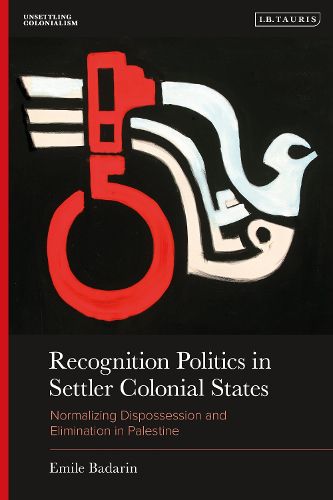Readings Newsletter
Become a Readings Member to make your shopping experience even easier.
Sign in or sign up for free!
You’re not far away from qualifying for FREE standard shipping within Australia
You’ve qualified for FREE standard shipping within Australia
The cart is loading…






Using Palestine as a case study, Recognition Politics in Settler Colonial States shows how recognition politics operate to legitimize long-standing colonial power structures. In existing scholarship, recognition has been seen as an asset coveted by indigenous communities. This book forwards a new, theoretically ground-breaking perspective. Emile Badarin shows that in colonial contexts, settlers use recognition to legitimize and normalize the dispossession and elimination of Indigenous people. More than this, settler-colonial states themselves actively pursue recognition, employing it as a means to further the elimination of the indigenous societies they seek to replace. In making the case, the book critically examines the Euromodern categories of race, racism and racial hierarchies and draws new conclusions about the interplay between colonialism, racism and Zionism. Central to this analysis is how anti-Zionism has been strategically equated with anti-Semitism, and effectively used as a tool for the advancement of both settler-colonialism in Palestine and Israel's recognition on the international stage. The book delves into indigenous normative resistance against colonial recognition politics through the lens of the Palestinian practice of ?umud (steadfastness), extracting its philosophy of liberation as a pathway towards a decolonial future for all in Palestine and beyond.
$9.00 standard shipping within Australia
FREE standard shipping within Australia for orders over $100.00
Express & International shipping calculated at checkout
Using Palestine as a case study, Recognition Politics in Settler Colonial States shows how recognition politics operate to legitimize long-standing colonial power structures. In existing scholarship, recognition has been seen as an asset coveted by indigenous communities. This book forwards a new, theoretically ground-breaking perspective. Emile Badarin shows that in colonial contexts, settlers use recognition to legitimize and normalize the dispossession and elimination of Indigenous people. More than this, settler-colonial states themselves actively pursue recognition, employing it as a means to further the elimination of the indigenous societies they seek to replace. In making the case, the book critically examines the Euromodern categories of race, racism and racial hierarchies and draws new conclusions about the interplay between colonialism, racism and Zionism. Central to this analysis is how anti-Zionism has been strategically equated with anti-Semitism, and effectively used as a tool for the advancement of both settler-colonialism in Palestine and Israel's recognition on the international stage. The book delves into indigenous normative resistance against colonial recognition politics through the lens of the Palestinian practice of ?umud (steadfastness), extracting its philosophy of liberation as a pathway towards a decolonial future for all in Palestine and beyond.